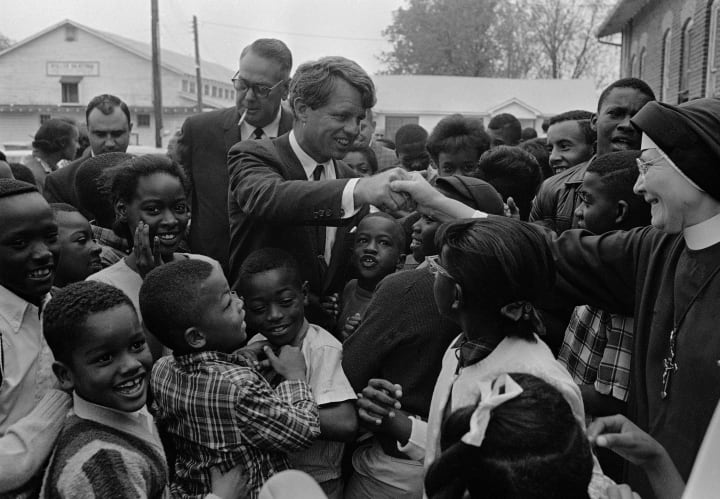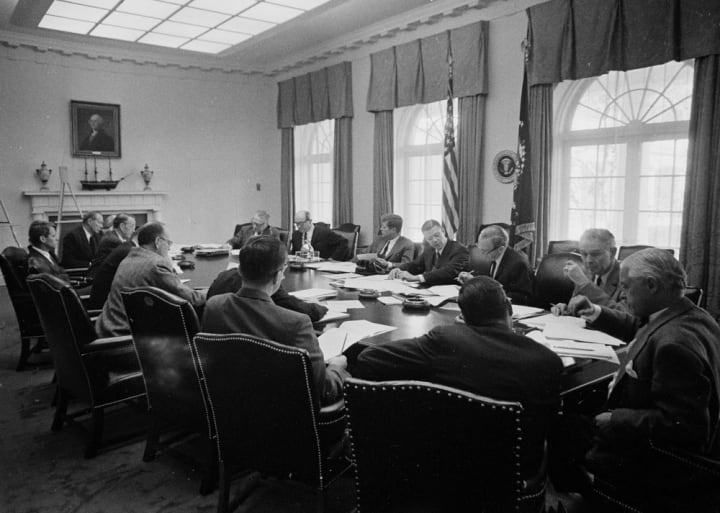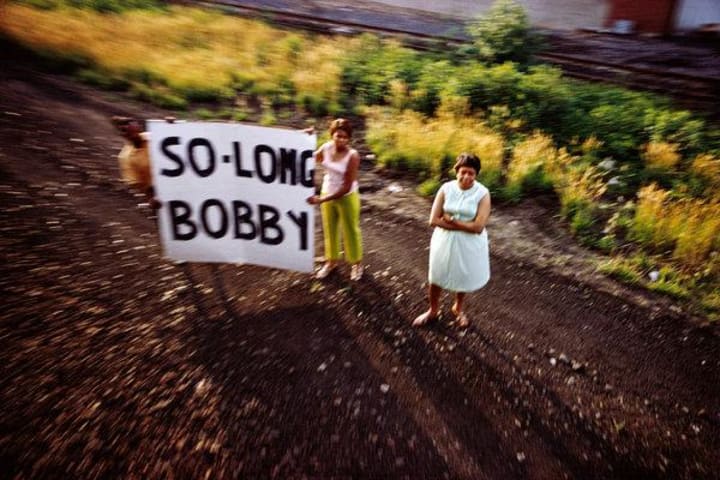With all the grief that surrounded America throughout the 1960s, Bobby’s death might have been the worst of all.
Robert Francis Kennedy was a family man and an open-minded politician who strived for change within the United States. Shot at the Ambassador Hotel in Los Angeles after winning the Californian presidential primary, Senator Kennedy left us with a legacy that still holds up today.
Robert was a visionary. He recognized the faults in the American political system and drastically wanted to change them in order for his children, their children and so on to have a brighter future. He interpreted the world in his own special way.
He lived life fully invested in what he believed in; hope for the future and equality for all. Serving as attorney general while his brother John was in office, he steadily became an advocate for peace in Vietnam and was actively fighting for civil rights, better education and improved housing conditions in poor neighbourhoods, something that would define his campaign for the presidency in 1968.

To start off the Kennedy story in any way it must be mentioned that it revolves around John F. Kennedy, who was elected the 35th President of the United States in 1960. It’s only after learning about his history that one can truly understand the moving pieces that worked around him, including his brother Robert.
Informally known as Bobby, his progression into political life was not as natural as Jack’s. Bobby’s work behind the scenes as his brother’s campaign manager, as attorney general, as a senator and in his own venture into presidential politics shows his journey taken as he moved from being a neutral politician to one of the most progressive of his time.
He was an integral part behind the scenes of JFK’s presidency. The Cuban Missile Crisis, the Alabama school integration and the release of Martin Luther King from prison were all tied to Bobby as he had huge parts to play in each.

Throughout his time as attorney general, Bobby’s views on certain issues changed. In turn, he ensured his brother also understood that development in the American ideal needed to happen. He was able to persuade his brother to think and act morally despite what the retribution may be. This growth was definitely a stepping stone for American politics.
Moving forward, Bobby made it his mission after Jack’s death to pursue the dreams of a better America that they shared. Abandoning his attorney generalship in 1964, he ran and won a seat in the Senate as the new U.S. Senator from New York and spent three years in office. He began changing his outlook on politics to doing good for communities and people over whether it was politically sound. Bobby was one of the first politicians to visit poorer places throughout the United States, like the Mississippi Delta and Appalachian Kentucky.
He eventually changed his tone towards the Vietnam War despite his earlier hesitation. Bobby wanted to see a change in the world and he wanted it now.
One of the riskiest moves as a politician at the time was visiting the ghettos in the Mississippi Delta. Unemployment, poverty and lack of proper education ran rapidly throughout the region. Children’s bellies were distended from malnutrition as mothers had no way to feed them.
Visiting such a poverty-stricken area in the heart of one of the richest countries in the world was heartbreaking for Bobby. You could feel that he was extremely sympathetic when he was visiting these places and knew that he was ultimately going to do something about it. It hurt him severely to see people unable to feed their own children. How could a country that’s on the economic rise have people struggling to survive?
Bobby wanted to fix that.
After Jack’s death, Bobby went into an extremely depressive state. This was a huge factor in his run for the presidency. Not only would he be going against the sitting president, Lyndon B. Johnson but he also continuously struggled with the result of his brother’s demise. Although Bobby debated endlessly with himself whether or not to run, he had come to accept he would face the same fate that his brother went through. This was especially so with how vocal he had become on certain issues including civil rights and fighting organized crime.
His acceptance of death was so apparent that when he was inevitably shot but remained on the floor conscious, one of his friends said he had, “an accepting look in his face like he knew what had happened.” What his friends and family feared the most had become reality. Another Kennedy with America’s hopes and dreams was killed due to gun violence.
Bobby had the simplistic ability to touch his audience, and in turn, they touched him. As his brother, Ted would later express in his eulogy:
“My brother need not be idealized or enlarged in death beyond what he was in life. To be remembered simply as a good and decent man, who saw wrong and tried to right it, saw suffering and tried to heal it, saw war and tried to stop it.Those of us who loved him and who take him to his rest today, pray that what he was to us and what he wished for others will someday come to pass for all the world.As he said many times, in many parts of this nation, to those he touched and who sought to touch him: Some men see things as they are and say why. I dream things that never were and say why not.”
The funeral train that carried Bobby’s body from New York to Washington, D.C. brought together a nation, the same way JFK’s funeral did in 1963. The thousands of people that watched as the train passed through their small towns captured what his fight had been for; bringing majorities and minorities together in harmony.
Thousands of people lined up to watch the funeral train pass through their cities two days after his death. No one had expected the number of people who would turn up. Michael Devorkin, a campaign worker for Bobby said it best:
“People were on the train tracks, hanging from the rafters. Nobody had any clue what kind of reaction there was going to be. People inside the train were all so overwhelmed by the response of average people. The people that were out there, that was the campaign.”

The train was put in place to carry Bobby’s body from New York to Washington to be buried at Arlington National Cemetery, right by his brother. Two men who once tried to bring change to the United States, back together again for eternity.
The most fascinating revelation when watching archival footage is the hundreds of thousands of people always trying to reach out and touch Bobby. While touring different neighbourhoods during his campaign he would lose shoes, cufflinks, have parts of his clothing torn off because of the calmness he exuded. Numerous times his hands would be bleeding after spending long hours shaking hands, only to show up late due to slow-moving motorcades. Bobby was known as a relentless politician, but to the American people, he had become a compassionate man that they trusted would lead them to a better country.
Bobby never wanted to only see a change in the present but a longing change that we’d be able to see in future generations to come.
With all the grief that surrounded America throughout the decade, Bobby’s death might have been the worst of all. The nation had no progressive direction to head in. The only man that had been to all parts of the country, who had seen the poverty plaguing its own land, and wanted to do something about it was Bobby. It was a long time coming, but minorities needed to be represented in office and Bobby finally gave them that voice.
The Kennedy’s, with all their flaws, knew how to capture the hearts of a nation. Bobby left behind a world that was confused in the direction they would inevitably take towards the future. The diverse side of the country that had found its voice, suddenly felt like there was nowhere to go. Certain social programs would never be implemented and their needs wouldn’t come before the wealthy once again.
Bobby was a shining star; the sun on a spring day and the calming voice in a world filled with chaos. As time progresses and 50 years have passed, who knows what the future could have looked like with him in it.

